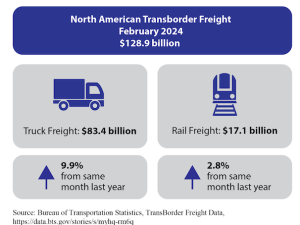U.S. Congress extends transport funding though May, averting cuts
By: Reuters | Aug 03 2014 at 09:28 PM | Intermodal
The U.S. Congress on Thursday approved a $10.9 billion funding extension for transportation construction projects through May 2015, averting a cutback in federal payments to states that was due to start on Friday.
Senate approval by a vote of 81-13 sent the measure to President Barack Obama to be signed into law after it bounced back and forth between the Senate and House of Representatives this week, raising uncertainty over the dwindling Highway Trust Fund.
The Senate on Tuesday had passed a smaller $8.1 billion plan lasting only through the end of 2014 that aimed to force action on a long-term highway and mass transit funding plan during the post-election, “lame duck” session of Congress.
But the House earlier on Thursday rejected the Senate plan and sent back its longer extension, which Democrats complained would put off consideration of long-term funding until next year, when a newly elected Congress takes office.
In the end, senators from both parties were unwilling to risk blame for allowing the Highway Trust Fund to run dry as they start a five-week summer recess on Friday.
“We really can’t walk away from the Highway Trust Fund, we can’t let it stagger and fall. Millions of jobs and thousands of businesses depend on it,” said Senator Barbara Boxer, a Democrat who was the chief proponent of the shorter extension.
The Department of Transportation had said that on Friday it would start reducing payments to states by as much as 30 percent from the fund, which is financed through fuel taxes.
Lawmakers and transportation officials had warned that such cutbacks would cause work slowdowns at the height of summer road construction season and halt planning for new projects, putting thousands of construction jobs at risk.
State transportation directors and business groups have been clamoring for a long-term solution that would eliminate uncertainty over the funding of road and rail transit projects that benefit the heavy construction industry and its suppliers, including Fluor Corp, Vulcan Materials, LaFarge SA and Caterpillar Inc.
The Highway Trust Fund has suffered chronic shortfalls in recent years as revenue from fuel taxes, unchanged since 1993, have failed to keep pace with rising construction costs and been hit by improved vehicle fuel economy. Some lawmakers have advocated a fuel tax increase and believe this may be easier to achieve after November’s congressional elections.
The funding plan in the approved legislation relies heavily on a controversial revenue source known as “pension smoothing” - an accounting maneuver that allows companies to reduce near-term contributions to employee pensions, thus increasing taxable profits.
It also extends certain customs fees for another year to 2024, and transfers $1 billion from a fund used to pay for the cleanup of leaking underground fuel storage tanks.







